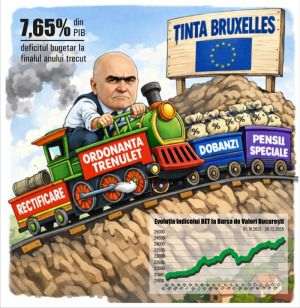All the banks that have granted CHF loans will be audited by the National Consumer Protection Authority (ANPC), its chairman Bogdan Pandelică, announced yesterday in the Economic Commission of the Senate.
The decision was made upon the request of PNL senator Daniel Cătălin Zamfir, the president of the specialized commission, who, aside from the head of the ANPC, also heard the representatives of the banking sector in the case of Raiffeisen Bank.
The ANPC levied a 50,000 lei fine against Raiffeisen Bank for unfair practices and decided their termination. The decision of the ANPC comes following the requests of the Tudose government and of the Presidential Administration, which have asked the institution to provide a resolution to a petition sent by the Group of CHF borrowers (GCCC).
That complaint concerned the leak, in the month of July, of internal documents attributed to Raiffeisen Bank, which show the strategy of the bank when it came to granting CHF loans.
Bogdan Pandelică yesterday said in the Senate that on Monday was issued the Order to cease the unfair practices, which will be signed today or tomorrow at the latest.
According to him, Raiffeisen Bank will be required to eliminate the clauses which involve the application of those practices for CHF loans. The contracts in question would revert to their initial form and the bank would be required to issue a new repayment schedule, at the initial interest rate.
"The ANPC found that not only has Raiffeisen not informed its customers about the risks of borrowing in CHF, but more than that, it has presented the product as safe, stable, and with a low interest rate. The audit will need to be extended to all the banks that have issued loans denominated in CHF, because all of the eight banks followed the same script", said Daniel Zamfir.
Florin Dănescu, the executive president of the Romanian Banking Association (ARB), addressed senator Zamfir, and urged him not to generalize by referring to all banks, when speaking about a certain context or a certain bank. Florin Dănescu said: "There are, after all, ten million depositors who have no issues with trusting banks. If that trust is lost, then major problems can occur. There are also the debtors, of whom just some have problems in their relationship with the banks".
In response, Daniel Zamfir said: "It has been proven that Raiffeisen has cheated people. There is nothing left to discuss".
The documents leaked online this summer showed that in February 2009, the Assets and Liabilities Committee of Raiffeisen Bank approved a new pricing structure for the guaranteed loans acquired starting with February 1st, 2008, which concern the hike of the interest rates on CHF-denominated loans. One of them, dated May 10th, 2007, was detailing a re-pricing program for the loans granted in 2006, which stipulated three stages, of which the latter two were targeting interest rate hikes - in September 2007 and respectively in January 2008 - for the previously granted CHF loans.
One of the internal documents attributed to Raiffeisen Bank said: "If customers request additional explanations about the reasons for the interest rate increase, and ask for a refinancing of the loan (through a loan from a different bank), the following arguments can be used:
- the borrower should be told not to forget that the interest rate offered by the other banks is set in the first year and would increase the next. If they were to refinance now with another bank they would bear some significant expenses (...) which could go as high as 2000-2500 Euros for an average loan of 30,000 Euros, in order to benefit from a lower interest rate for just a year, after which they would find themselves in the same situation as before;
- The customer shouldn't just look at the interest rate, but also at the commissions charged by the competing banks (monthly or annual maintenance fees, loan origination fee). If those fees are taken into account, they will see that they will end up with the same interest that Raiffeisen is charging them, or higher;
- If they decide to refinance the loan they have now at RBRO, they should also think of the costs: 3% - early repayment fee, loan application review fee at the other bank, appraisal report fee, notary fees that can be substantial, origination fee. If they add these amounts and divide the amount by the loan duration, they will see that the monthly payment will be the same or even higher;
- The customer has benefited from a promotional interest rate in the first year, which allowed them to qualify for a bigger loan. But now, the interest rate has become variable and has been brought to match the market. But the customer can be told, for those who have mortgages denominated in Euros, that they are getting a good interest rate anyway (8.5% compared to 9% which the interest rate currently being offered by the bank - for the interest that can be reviewed)".
An address recently sent by the National Consumer Protection Authority (ANPC) to the attention of GCCC states: "Concerning your complaints sent to the General Secretariat of the Government, and to the Presidential Administration, respectively, redirected to the National Consumer Protection Authority (...) directed against Raiffeisen Bank SA, we inform you that following our investigations, the investigation team has uncovered violations of the law no. 363/2007 concerning unfair trade practices, which is why the company has been sanctioned for violations of that law, and has been required to cease its unfair trade practices. We must mention the fact that the bank reserves the right to challenge in court the sanction and the measures that were decided against it".
The audit team of the ANPC has found that the bank did not do all the necessary due diligence in its relationship with the consumers, demonstrating "a total lack of concern over the consumers' degree of indebtedness", the minutes show. "Between February - December 2008, Raiffeisen Bank issued 914 loans with a promotional interest rate of 4.6% and had input in the system the fact that the exchange rate would be at 5.4% after a year (information which was not made available to any of the consumers) and subsequently raised it by 5.6%. According to the contract, debtors could have opted for a flat interest rate, but that option was not within the field of view in order for the consumer to accept that option (8.6%/year, 14%/3 years, respectively). According to the complaint, it becomes clear that the bank would use this practice for its entire loan portfolio (including lei and Euros). (...)9,658 customers were affected, for an amount of 389.2 million Euros".
The quoted document shows that, in one of its opinions, Raiffeisen Bank says that it does not rule out the situation "where those original documents were stolen by the individual/individuals that leaked them to the press". In this context, the ANPC stresses that "the bank does not deny the validity of the documents that have appeared in the press".
The affected consumers have the right to demand in court the recalculation of their interest rates and the reimbursement of the amounts unfairly collected by the bank.
The representatives of Raiffeisen Bank told us that they would challenge the resolution of the ANPC. In summer they told us that the bank has always complied with the legislation applicable to the contracts it signed with all its customers, and starting with 2009 it has proposed a number of measures to relieve the financial burden of their borrowers who were having difficulty repaying their loans, "even if that meant additional capital costs and the reduction of the bank's revenues".











































